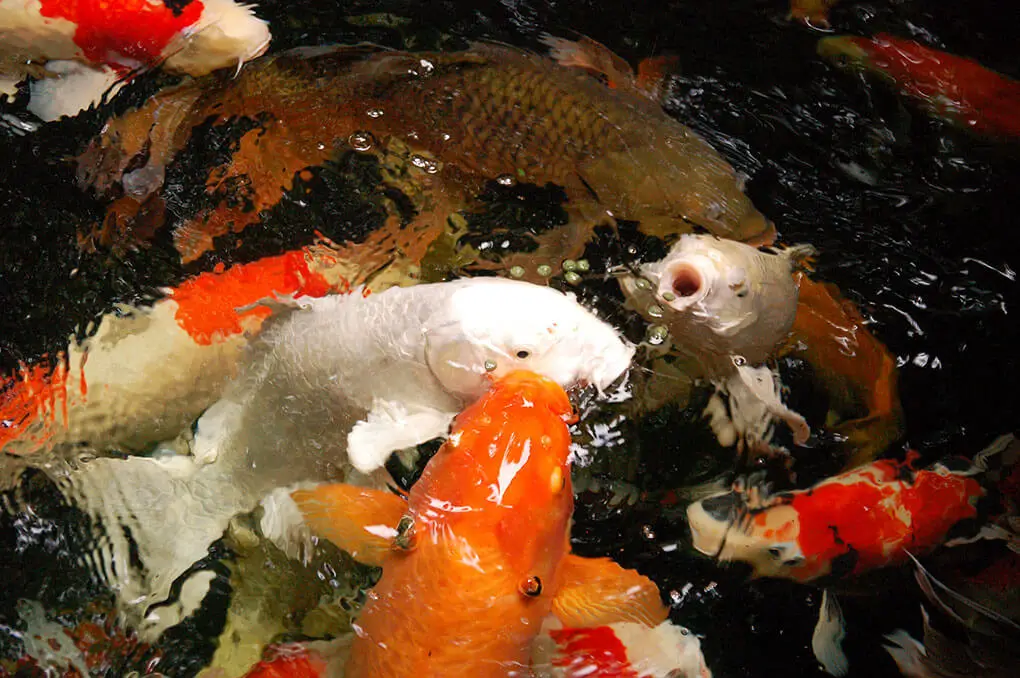Koi are omnivores, which means that they consume both plant and animal matter. In fact, they often prefer eating aquatic larvae and insects. Koi fish make incredibly beautiful pets—though they’re also incredibly voracious fish. These elegantly decorated fish actually devour nearly anything that finds its way into their water. Since koi fish eat practically anything, you have to make sure your fish gets fed a diet that’s both nutritious and balanced.
There are many options for koi food. These options oft include live insects, commercialized dry foods and supplements, fresh foods and even occasional treats. The most common foods available for koi fish are commercialized foods, often comprised of specially formulated pellets, granules, chunks, flakes and tablets. Commercial koi foods can be easily stored and are rather inexpensive—not to mention, they also contain a sufficient amount of nutrient fortified ingredients.
Important Factors when Choosing the Right Food
When you shop for koi food, you need to consider two factors. The first factor involves the age and size of your pet, while the second often involves the time of year. It’s recommended to feed your koi more protein in the summer than during winter months, when they are less active. Smaller-sized food like small pellets are more ideal for smaller koi, while bigger koi naturally feed on larger-sized foods.
Koi Food Supplements
Supplements for koi help enhance the overall health of your pet. They also provide beneficial effects that support and boost their immune systems. In fact, many types of commercial koi food include some form of nutrition supplementation. There’s also supplement powders made to be mixed into koi foods.
Koi fish can also consume fresh foods, however it’s best to sparingly give your fish these foods. A number of fruits and vegetables can be used as koi food, including lettuce, oranges and garlic. Insects and other aquatic critters are also ideal koi ‘treats’ to supplement their diets.
Many of these insects and critters range from prawns, soft-shelled crickets and worms like waxworms and bloodworms. These critters provide a protein boost to their diets. It’s recommended, though, to provide your koi fish with pesticide-free critters, as the chemicals may likely cause a detrimental effect to their well-being.
To ensure that your koi gets the best food possible, don’t forget to review the labels on the food you’re offering your koi. If you’re purchasing their food online, make sure the retailer has a sufficient amount of information about the food you’re buying for your pet. If you can’t find any information about a particular product, it’s advised to avoid purchasing it.


I recently moved into a house that has an outdoor koi pond and I have little information about how to care for it. I believe I know the basics but there is one thing I’m still unsure about. I have about 20-30 koi fish in my pond and they are all from small-medium size; how much should I be feeding my fish and how many times should I be feeding them per day. I know that this depends on the water temperature which I’m unsure about but I know that outside it is usually in the mid eighties. I also have a broken pump and need to get a new filter which I am also unsure about. I need a lot of help. Thanks!
What you can do to “dial it in” on the food amount is by using floating food and that way whatever is left over can be seen and removed (and the next time you’ll know to feed less).
As far as your pump goes that will depend on the volume of your pond. You can always look up what kind of pump it is to see its ratings and then make your next pump purchase of similar ratings.
-Grant